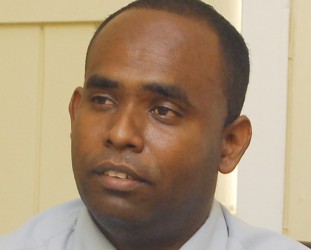The Guyana Police Force has received the results for some of the DNA samples sent to Brazil last year February as part of an agreement between the two countries and Police Commissioner Seelall Persaud has informed that a timely delivery was affected by an issue with the lab.
Officials in the Guyana Police Force have been unable to say when the results arrived but based on this newspaper’s information it would have been earlier this year.
Crime Chief Wendell Blanhum told Stabroek News yesterday that results have been received for between eight and ten cases, including a triple murder at Anna Catherina, the Igris Blackman murder, a fatal accident and a hanging in Berbice.

It was explained that the results were written in Portuguese and as a result the police need to have them translated. According to Blanhum, immigration personnel have so far managed to translate the results for one case. The others will soon be translated, he said.
Blanhum said that in the Blackman matter, the analysis found no match for the sample sent. It was explained that police were attempting to link a suspect to the crime through DNA. The suspect was charged and later freed.
On the fatal accident, the police had some suspicions about the identity of the person responsible and blood which was found on a vehicle involved in the accident was sent for testing. Regarding the hanging, he said that there were conflicting information, some of which suggested that it might not have been a suicide.
Among the other cases for which samples were sent are the April, 2013 murder/rape of 90-year-old Millicent Prince-Cum-mings and the Sparendaam plane crash.
The April 14, 2013 plane crash claimed the lives of two foreigners–Pierre Angiel, a 71-year-old American pilot and 54-year-old Canadian Engi-neer Nick Dmitriev. One of the men had been burnt beyond recognition and the sample was sent for identification purposes.
Responding to questions on the force’s ability to deal with material written in foreign languages, Blanhum said that there are immigration officers who can translate Portuguese, Spanish and French.
Persaud, when he was Crime Chief in November, 2013, had told Stabroek News that the first request to Brazil for assistance in the area of forensics was made through a liaison officer based in George-town. He said that subsequently a formal request was made during a joint annual cooperation meeting.
After the meeting, which was held in Brazil, the discussions went back and forth until the two sides finally reached an agreement to have samples sent to Brazil for forensic analysis. No information was provided on what the agreement entails but Persaud noted that the arrangement would have been very beneficial as forensic analysis compliments the work of detectives.
Recently, Stabroek News asked Persaud why the force had not been turning to Brazil when there was an agreement in place and he responded that “there were some issues with the lab, not the agreement, but the lab itself and that would have caused a delay. That’s why those were delayed anyhow, so we don’t want to send more there now….”
Asked if the Brazilians have communicated with the force as it relates to more samples being sent, he said Brazil has a federal police liaison officer who is based in Guyana and the force is in contact “every day with Brazil.”
Over the years the country has been struggling to find a reliable lab to conduct DNA testing given the fact that such facilities are not available here in Guyana. The previous government has been heavily criticized for not including DNA testing in the Guyana Forensic Lab which was commissioned last year after ongoing problems during its construction. Government spends millions of dollars to have DNA testing done abroad and observers have repeatedly said that the money could have been invested so that the testing can be done right here.





